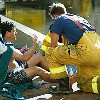
Researchers Urge Awareness of Emotional Distress Facing First Responders
Professional first responders are prepared, equipped, and trained to handle various emergency situations, from car accidents to terrorist attacks and other major disasters. Today, however, this great responsibility can be particularly burdensome on one's emotions.
"As first responders, part of our job is to run towards a bad or challenging situation to help out, while everyone else runs away," said Dan Ennenbach, a Kirkwood police officer. "However, the psychological repercussions of what we may experience in those situations can be overwhelming and, in some cases, even life-changing. In a sense, we also can become victims, simply because we're affected by what's happened."
According to Miggie Greenberg, M.D., assistant professor of neurology and psychiatry at Saint Louis University School of Medicine, different people react to traumatic situations differently. It's not uncommon to experience a broad range of emotions--it's actually quite normal and healthy. The challenge with first responders is that they are trained to deal with high-intensity situations without emotionally reacting. Therefore, the aftermath can be that much more devastating. Additionally, those who have experienced some type of trauma in the past are more likely to react adversely to a traumatic event.
Like most first responders, Ennenbach has wrestled with the emotional aftermath of the tragic incidents he has witnessed. He has learned a lot during his nine years on the force, and now uses his experience and knowledge to help other first responders better cope with the emotional challenges of the job. As a crisis intervention team specialist, Ennenbach has been trained to recognize the symptoms of psychological distress, including lack of sleep, unexplained weight loss, lack of focus, and irritability, to name a few.
"Following a traumatic incident, you have to step back and evaluate things, both personally and professionally," Ennenbach said. "Of course, in our line of work, it can be that much more difficult. It's important to recognize the difference between a normal, healthy reaction and an unhealthy one."
Some normal reactions include being in shock, feeling sad, acting more emotional, having intrusive thoughts about the incident, and behaving in a hyper-vigilant manner. These should fade over time. However, when one's day-to-day routine is frequently sidetracked by such reactions, then this may be evidence of major distress. Some signs of psychological distress include constant anxiety, inexplicable crying, erratic behavior, isolation, and the increase use of drugs and/or alcohol. This distress can be characterized as one of the following and may require professional treatment:
- Critical Incident Stress Reactions (CISR), which occurs during or within six to 12 weeks following the critical incident, and
- Post Traumatic Stress Disorder (PTSD), which can last for months or years following the incident unless proper treatment is received.
It generally takes some time to recover from the emotional wounds following a traumatic event. In the meantime, there are several points that can help offset the effects. "First, having a reliable support network in place is key--from your friends and family to your workplace and faith-based community," Greenberg said. She also recommends regularly practicing the following preventative measures:
- Taking a break from situations where you have no control. In other words, don't go back to work immediately after such an event;
- Connecting with other people in your life, including your family, friends, and colleagues;
- Exercising regularly can help relieve your stress.
If you or your colleague is emotionally distressed following a traumatic event, ask for help. There are numerous resources available to help navigate through these difficult times. Research local support groups in your area. Consult with your general physician. Request a referral for a counselor or psychologist.
"I often remind my colleagues that emotional injuries are just like physical injuries," Ennenbach said. "We rely on medical professionals to properly treat our physical injuries; therefore, we should also rely on them for our emotional injuries."
For more information, visit the Sidran Traumatic Stress Institute at www.sidran.org or the National Center for Post Traumactic Stress Disorder at www.ncptsd.va.gov.